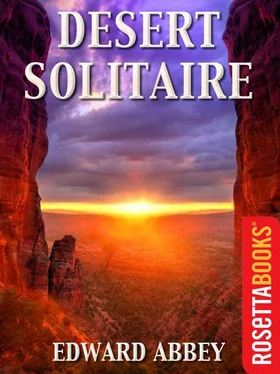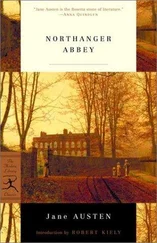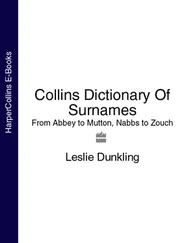Abbey, Edward - Desert Solitaire (Edward Abbey Series )
Здесь есть возможность читать онлайн «Abbey, Edward - Desert Solitaire (Edward Abbey Series )» — ознакомительный отрывок электронной книги совершенно бесплатно, а после прочтения отрывка купить полную версию. В некоторых случаях можно слушать аудио, скачать через торрент в формате fb2 и присутствует краткое содержание. Год выпуска: 2011, Издательство: RosettaBooks, Жанр: Старинная литература, на английском языке. Описание произведения, (предисловие) а так же отзывы посетителей доступны на портале библиотеки ЛибКат.
- Название:Desert Solitaire (Edward Abbey Series )
- Автор:
- Издательство:RosettaBooks
- Жанр:
- Год:2011
- ISBN:нет данных
- Рейтинг книги:4 / 5. Голосов: 1
-
Избранное:Добавить в избранное
- Отзывы:
-
Ваша оценка:
- 80
- 1
- 2
- 3
- 4
- 5
Desert Solitaire (Edward Abbey Series ): краткое содержание, описание и аннотация
Предлагаем к чтению аннотацию, описание, краткое содержание или предисловие (зависит от того, что написал сам автор книги «Desert Solitaire (Edward Abbey Series )»). Если вы не нашли необходимую информацию о книге — напишите в комментариях, мы постараемся отыскать её.
Desert Solitaire (Edward Abbey Series ) — читать онлайн ознакомительный отрывок
Ниже представлен текст книги, разбитый по страницам. Система сохранения места последней прочитанной страницы, позволяет с удобством читать онлайн бесплатно книгу «Desert Solitaire (Edward Abbey Series )», без необходимости каждый раз заново искать на чём Вы остановились. Поставьте закладку, и сможете в любой момент перейти на страницу, на которой закончили чтение.
Интервал:
Закладка:
Why do they sing? What do they have to sing about? Somewhat apart from one another, separated by roughly equal distances, facing outward from the water, they clank and croak all through the night with tireless perseverance. To human ears their music has a bleak, dismal, tragic quality, dirgelike rather than jubilant. It may nevertheless be the case that these small beings are singing not only to claim their stake in the pond, not only to attract a mate, but also out of spontaneous love and joy, a contrapuntal choral celebration of the coolness and wetness after weeks of desert fire, for love of their own existence, however brief it may be, and for joy in the common life.
Has joy any survival value in the operations of evolution? I suspect that it does; I suspect that the morose and fearful are doomed to quick extinction. Where there is no joy there can be no courage; and without courage all other virtues are useless. Therefore the frogs, the toads, keep on singing even though we know, if they don’t, that the sound of their uproar must surely be luring all the snakes and ringtail cats and kit foxes and coyotes and great horned owls toward the scene of their happiness.
What then? A few of the little amphibians will continue their metamorphosis by way of the nerves and tissues of one of the higher animals, in which process the joy of one becomes the contentment of the second. Nothing is lost, except an individual consciousness here and there, a trivial perhaps even illusory phenomenon. The rest survive, mate, multiply, burrow, estivate, dream, and rise again. The rains will come, the potholes shall be filled. Again. And again. And again.
More secure are those who live in and around the desert’s few perennial waterholes, those magical hidden springs that are scattered so austerely through the barren vastness of the canyon country. Of these only a rare few are too hot or too briny or too poisonous to support life—the great majority of them swarm with living things. Here you will see the rushes and willows and cottonwoods, and four-winged dragonflies in green, blue, scarlet and gold, and schools of minnows in the water, moving from sunlight to shadow and back again. At night the mammals come—deer, bobcat, cougar, coyote, fox, jackrabbit, bighorn sheep, wild horse and feral burro—each in his turn and in unvarying order, under the declaration of a truce. They come to drink, not to kill or be killed.
Finally, in this discussion of water in the desert, I should make note of a distinctive human contribution, one which has become a part of the Southwestern landscape no less typical than the giant cactus, the juniper growing out of solid rock or the red walls of a Navajo canyon. I refer to the tiny oasis formed by the drilled well, its windmill and storage tank. The windmill with its skeleton tower and creaking vanes is an object of beauty as significant in its way as the cottonwood tree, and the open tank at its foot, big enough to swim in, is a thing of joy to man and beast, no less worthy of praise than the desert spring.
Water, water, water.… There is no shortage of water in the desert but exactly the right amount, a perfect ratio of water to rock, of water to sand, insuring that wide, free, open, generous spacing among plants and animals, homes and towns and cities, which makes the arid West so different from any other part of the nation. There is no lack of water here, unless you try to establish a city where no city should be.
The Developers, of course—the politicians, businessmen, bankers, administrators, engineers—they see it somewhat otherwise and complain most bitterly and interminably of a desperate water shortage, especially in the Southwest. They propose schemes of inspiring proportions for diverting water by the damful from the Columbia River, or even from the Yukon River, and channeling it overland down into Utah, Colorado, Arizona and New Mexico.
What for? “In anticipation of future needs, in order to provide for the continued industrial and population growth of the Southwest.” And in such an answer we see that it’s only the old numbers game again, the monomania of small and very simple minds in the grip of an obsession. They cannot see that growth for the sake of growth is a cancerous madness, that Phoenix and Albuquerque will not be better cities to live in when their populations are doubled again and again. They would never understand that an economic system which can only expand or expire must be false to all that is human.
So much by way of futile digression: the pattern is fixed and protest alone will not halt the iron glacier moving upon us.
No matter, it’s of slight importance. Time and the winds will sooner or later bury the Seven Cities of Cibola—Phoenix, Tucson, Albuquerque, all of them—under dunes of glowing sand, over which blue-eyed Navajo bedouin will herd their sheep and horses, following the river in winter, the mountains in summer, and sometimes striking off across the desert toward the red canyons of Utah where great waterfalls plunge over silt-filled, ancient, mysterious dams.
Only the boldest among them, seeking visions, will camp for long in the strange country of the standing rock, far out where the spadefoot toads bellow madly in the moonlight on the edge of doomed rainpools, where the arsenic-selenium spring waits for the thirst-crazed wanderer, where the thunderstorms blast the pinnacles and cliffs, where the rust-brown floods roll down the barren washes, and where the community of the quiet deer walk at evening up glens of sandstone through tamarisk and sage toward the hidden springs of sweet, cool, still, clear, unfailing water.
THE HEAT OF NOON:
ROCK AND TREE AND CLOUD
At lunchtime I leave my post at the entrance station, hurrying from its shade through the blaze to the housetrailer, where I take a pitcher from the refrigerator and still in a hurry gulp down about a pint of fruit juice without stopping for breath. There are times in this hot and arid place when my thirst becomes so intense I cannot seem to drink any liquid fast enough to quench it.
July. Though all the windows are wide open and the blinds rattle in a breeze the heat is terrific. The inside of the trailer is like the inside of a kiln, a fierce dry heat that warps the loose linoleum on the floor, turns an exposed slice of bread into something like toast within half an hour, makes my papers crackle like parchment.
I take off my shirt and hang it over a chair; the sweat-soaked armpits will dry within five minutes, leaving a rime of salt along the seams. Hastily I assemble a couple of sandwiches: lettuce, leftover bacon from breakfast, sliced ham, peanut butter, salami, longhorn cheese, cashews, raisins, horseradish, anything else that will fit comfortably between two slices of bread—and take the dewy-cold pitcher of juice and hasten outside and through the storm of sunlight over the baking sandstone of the 33,000-acre terrace to the shade and relative coolness of the ramada.
The thermometer nailed to a post reads 110° F., but in the shade, with a breeze and almost no humidity, such a temperature is comfortable, even pleasant. I sit down at the table, pull off my boots and socks, dig my toes into the gritty, cleansing sand. Fear no more the heat of the sun. This is comfort. More, this is bliss, pure smug animal satisfaction. I relax beneath the sheltering canopy of juniper boughs and gaze out squinting and blinking at a pink world being sunburned to death.
Yes, July. The mountains are almost bare of snow except for patches within the couloirs on the northern slopes. Consoling nevertheless, those shrunken snowfields, despite the fact that they’re twenty miles away by line of sight and six to seven thousand feet higher than where I sit. They comfort me with the promise that if the heat down here becomes less endurable I can escape for at least two days each week to the refuge of the mountains—those islands in the sky surrounded by a sea of desert. The knowledge that refuge is available, when and if needed, makes the silent inferno of the desert more easily bearable. Mountains complement desert as desert complements city, as wilderness complements and completes civilization.
Читать дальшеИнтервал:
Закладка:
Похожие книги на «Desert Solitaire (Edward Abbey Series )»
Представляем Вашему вниманию похожие книги на «Desert Solitaire (Edward Abbey Series )» списком для выбора. Мы отобрали схожую по названию и смыслу литературу в надежде предоставить читателям больше вариантов отыскать новые, интересные, ещё непрочитанные произведения.
Обсуждение, отзывы о книге «Desert Solitaire (Edward Abbey Series )» и просто собственные мнения читателей. Оставьте ваши комментарии, напишите, что Вы думаете о произведении, его смысле или главных героях. Укажите что конкретно понравилось, а что нет, и почему Вы так считаете.












